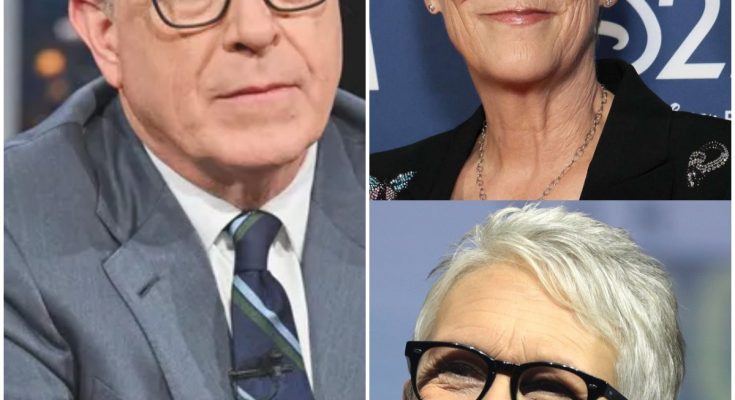It began with a whisper, the kind of rumor that moves quietly through Hollywood’s backrooms before exploding into public view. But when Jamie Lee Curtis—Oscar winner, activist, and beloved friend of Stephen Colbert—stood before the cameras and leveled her accusation, there was nothing quiet about it. In a single, electrifying moment, Curtis transformed what was already a late-night television crisis into a full-blown scandal, one that threatened not only CBS’s reputation but also the very future of late-night entertainment.
The story, as Curtis tells it, is as complex as any Hollywood thriller. She claims CBS didn’t just cancel The Late Show with Stephen Colbert—they orchestrated it, part of a larger conspiracy involving bribery, sabotage, and a campaign to silence those who dared to speak out. The network, she alleges, tried to “gag” her, warning her to keep quiet about the real reasons behind Colbert’s ouster. But Jamie Lee Curtis is not someone who scares easily. Instead, she’s vowed to expose what she calls a “malicious plot” against her friend, even as CBS scrambles to contain the fallout.
The result is a storm that’s shaking late-night TV to its core—a drama playing out in headlines, on social media, and behind closed doors in network boardrooms. It’s a story of power, betrayal, and the high-stakes world of modern television, where the truth is often stranger—and more dangerous—than fiction.
The first tremors were felt when CBS announced, without warning, that it was ending The Late Show with Stephen Colbert. The news sent shockwaves through the entertainment world. Colbert, with his quick wit, sharp intellect, and deep empathy, had become a staple of American television, a voice millions turned to for both laughter and comfort in turbulent times. His monologues dissected politics and culture with surgical precision, while his interviews revealed a warmth and vulnerability rare in late-night hosts.
Fans were stunned. Celebrities rushed to his defense. Social media erupted with outrage and speculation. But even in the chaos, nothing prepared anyone for what came next.
Just days after the announcement, Jamie Lee Curtis appeared at a charity gala in Los Angeles. The event was supposed to be a celebration—a night of glitz, glamour, and good deeds. But as Curtis took the stage, her face was grave. She began by praising Colbert, calling him “one of the most principled, compassionate people I’ve ever known.” Then her tone shifted.
“What happened to Stephen isn’t just a business decision,” she said, her voice trembling with conviction. “It’s a calculated act. And CBS is trying to silence anyone who knows the truth.”
The room fell silent. Cameras flashed. Within minutes, her words were racing across the internet, igniting a firestorm of speculation. What did she mean? What did she know?
In the days that followed, Curtis doubled down. She gave interviews to major outlets, posted on her social media accounts, and even appeared on rival late-night shows, refusing to mince words. According to Curtis, CBS executives had been plotting Colbert’s removal for months, pressured by powerful outside interests unhappy with his political commentary and growing influence. She claimed that bribes had changed hands, that key staffers had been threatened or paid off, and that a campaign of misinformation had been waged to make Colbert appear “difficult” and “unreliable” to the public and advertisers alike.
Most explosively, Curtis alleged that CBS had attempted to “gag” her—threatening legal action and blacklisting if she spoke out. “They told me, in no uncertain terms, to keep my mouth shut,” she told The Hollywood Reporter. “But I won’t be bullied. I won’t let them erase Stephen’s legacy—or hide their own corruption.”
Curtis’s claims were met with a mixture of disbelief and support. Some dismissed her as a conspiracy theorist, pointing to the lack of concrete evidence. Others saw her as a whistleblower, bravely standing up to a powerful institution. Hashtags like #StandWithJamie and #JusticeForColbert trended for days, as fans and fellow celebrities debated the truth behind the scandal.
CBS, for its part, issued a terse statement: “We categorically deny Ms. Curtis’s allegations. The decision to end The Late Show with Stephen Colbert was made solely for business reasons, and any suggestion otherwise is false and defamatory.” But the damage was done. The network’s denials only fueled the speculation, and the story refused to die.
Behind the scenes, the fallout was even more dramatic. Sources inside CBS described a network in crisis, with executives holding emergency meetings, public relations teams working overtime, and advertisers demanding answers. Staffers from The Late Show, many of whom had worked with Colbert for years, were caught in the crossfire—some quietly supporting Curtis, others fearful for their jobs.
Late-night television, long regarded as the last bastion of irreverent free speech, suddenly seemed under siege. Rival hosts weighed in, some with jokes, others with genuine concern. Jon Stewart, Colbert’s mentor and friend, devoted an entire segment to the controversy, calling Curtis “a truth-teller in a town that desperately needs more of them.” Jimmy Kimmel and Seth Meyers offered their own tributes to Colbert, while Trevor Noah urged viewers to “look beyond the headlines and ask who benefits when a voice like Stephen’s is silenced.”
As the days turned into weeks, Curtis’s campaign gathered momentum. She called for an independent investigation into CBS’s decision-making, launched a petition that quickly garnered hundreds of thousands of signatures, and even hinted at the possibility of legal action. “This isn’t just about Stephen,” she told Variety. “This is about the future of free speech, of comedy, of holding power to account. If they can do this to him, they can do it to anyone.”
But why, exactly, would CBS want Colbert gone? And why would they go to such lengths to silence Curtis and others who supported him?
Industry insiders point to a confluence of factors. Colbert’s show, while still popular, had seen ratings fluctuate in recent years as streaming platforms and shifting viewer habits upended traditional television. More controversially, Colbert had become increasingly outspoken in his criticism of political leaders, corporate interests, and even the media itself. Some advertisers reportedly balked at his biting commentary, while certain executives worried that his activism was alienating key demographics.
“There’s always been tension between creative freedom and corporate interests,” says Dr. Lisa Mendel, a media studies professor at UCLA. “But what’s happening now feels different. There’s a sense that the walls are closing in, that the space for genuine dissent on network TV is shrinking.”
Curtis, for her part, is adamant that Colbert’s firing was about more than ratings or business. “He made powerful enemies,” she insists. “And those enemies wanted him off the air. CBS just did their dirty work.”
As the controversy raged, Colbert himself remained largely silent. In a brief statement, he thanked his fans, his staff, and his family, saying only, “I’ve always believed in the power of comedy to reveal the truth. I’m grateful for the chance to have done that for so many years, and I look forward to whatever comes next.”
But behind the scenes, friends say, Colbert was deeply hurt by the manner of his exit—and grateful for Curtis’s support. “Stephen doesn’t like drama,” one longtime colleague confided. “But he knows Jamie’s heart is in the right place. She’s fighting for him, and for all of us.”
The battle lines were drawn. On one side, a beloved actress risking her career to expose what she sees as a grave injustice. On the other, a powerful network desperate to protect its image and bottom line. In the middle, millions of viewers wondering what to believe—and what the future holds for the shows and voices they love.
The ripple effects of the scandal have already begun to reshape the late-night landscape. Other hosts, emboldened by Curtis’s example, are reportedly renegotiating their contracts to protect their creative independence. Networks are rethinking their approach to talent relations, wary of appearing heavy-handed or censorious. And audiences, once content to watch from the sidelines, are demanding more transparency, more accountability, and more respect for the artists who fill their nights with laughter and insight.
Perhaps most importantly, the story has reignited a national conversation about the role of late-night TV in American culture. For decades, these shows have provided not just entertainment, but a vital space for political satire, social commentary, and the airing of uncomfortable truths. In an era of polarization and misinformation, their importance has only grown.
“What Jamie Lee Curtis is doing is bigger than Stephen Colbert,” says Mendel. “She’s reminding us that comedy is a form of resistance, that laughter can challenge power, and that the people who make us laugh deserve our protection.”
As the weeks go by, the outcome remains uncertain. CBS faces mounting pressure to address Curtis’s allegations, with some calling for congressional hearings and others predicting a wave of lawsuits. Curtis herself shows no signs of backing down, promising new revelations and vowing to take her fight “as far as it needs to go.”
For Colbert, the future is unwritten. Friends say he’s considering offers from streaming platforms, podcast networks, and even independent production companies. Wherever he lands, his legion of fans is sure to follow.
But the biggest question may be what comes next for late-night TV itself. Will Curtis’s crusade lead to real change, or will the forces she’s battling simply retreat into the shadows, waiting for the storm to pass? Will other stars find the courage to speak out, or will fear and self-preservation keep them silent?
One thing is certain: the age of quiet compliance is over. Thanks to Jamie Lee Curtis, the world is watching—and waiting.
In the end, the story of Jamie Lee Curtis vs. CBS is about more than just one show, one host, or even one network. It’s about the power of truth, the courage to speak out, and the enduring belief that laughter matters. It’s a reminder that, in the battle between art and commerce, between honesty and expedience, there are still those willing to risk everything for what they believe is right.
As Curtis herself put it, standing defiantly before a sea of cameras, “They can try to gag me. They can try to silence us all. But the truth has a way of getting out. And I promise you—I won’t stop until it does.”
For now, the lights may be dimmed on The Late Show with Stephen Colbert. But thanks to the courage of one woman, the fight for the soul of late-night TV has only just begun.



